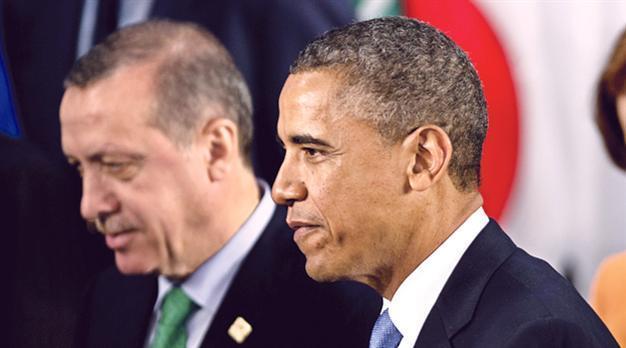Obama, Erdoğan mull post-Assad action plan
ANKARA - Hürriyet Daily News

This file photo shows Obama (R) and Erdogan leave after the family picture of the G-20 Summit of Heads of State and Government in Mexico.AFP photo
U.S. President Barack Obama and Turkish Prime Minister Recep Tayyip Erdoğan held a lengthy telephone conversation on July 30 to discuss ways to fill the power vacuum if President Bashar al-Assad suddenly loses control in
Syria.
A senior Turkish official, speaking on condition of anonymity, told the Hürriyet Daily News yesterday that the telephone conversation took place after Erdoğan sent a note to Obama’s office to offer his condolences for a July 20 shooting in Colorado in which 12 people were killed.
Efforts by the two countries’ diplomats brought the Syria issue to the agenda as well. “If the al-Assad regime loses control of big cities such as Damascus and Aleppo earlier than expected, there should not be a power vacuum. Thus the Syrian National Council [SNC] should take control temporarily and the opposition groups other than the SNC should also be included within this process,” the same official told the Daily News, summarizing the conversation between Erdoğan and Obama.
The two leaders oppose the “de-Baathification” of Syria, in an apparent reference to Iraq’s de-Baathification – which tarred every member of Iraq’s ruling Baath party as an enemy of the fragile new state, the official said.
During the conversation, the pair discussed how figures of the old regime who have not participated in violence against civilians should take part in a possible new Syrian administration, the official said, adding that the leaders agreed that “all opposition groups want Bashar al-Assad to leave Syria if and when the al-Assad regime falls, and
Turkey is also in favor of this idea.”
Erdoğan and Obama agreed that security officials and diplomats should work on such elements so that the two will have more concrete matters to discuss in their next telephone conversation, he said.
In the meantime, the leaders agreed that contact on the issue should be maintained between Foreign Minister Ahmet Davutoğlu and U.S. Secretary of State Hillary Clinton, as well as between Ambassador Feridun Sinirlioğlu, the undersecretary of the Turkish Foreign Ministry, and his U.S. counterpart, he said.
White House statement
Talks between the two leaders aimed at “coordinating efforts to accelerate a political transition in Syria.” The coordination “would include the departure of Bashar al-Assad and be responsive to the legitimate demands of the Syrian people,” the White House said in a statement.
Obama and Erdoğan shared their concerns about the Syrian regime’s crackdown on the opposition “and the deteriorating humanitarian conditions throughout Syria as a result of the regime’s atrocities.” Both promised to coordinate efforts to help the growing number of Syrians displaced by the violence within Syria or forced to flee across the border to take refuge in Turkey or other nations in the region.
The conversation July 30 came after an almost seven-month hiatus which led to speculation about whether there was a rift between Ankara and Washington because of the difference in their approaches to the Syria issue, as the two leaders are generally known to hold almost regular telephone conversations concerning the global agenda as well as bilateral relations.
Last month, daily Hürriyet reported that Erdoğan and Obama held 13 telephone conversations in 2011. U.S. officials told Hürriyet the date of the most recent telephone conversation between Erdoğan and Obama was Jan. 13, 2012.
In Ankara, Anatolia news agency reported late on July 30 that the telephone conversation was initiated by Erdoğan and lasted 36 minutes.
The White House statement said the U.S. and Turkish teams “would remain in close contact on ways that Turkey and the United States can work together to promote a democratic transition in Syria.” Ankara has become a champion of the uprising against al-Assad’s Syrian regime and has given refuge to large numbers of army defectors, who have formed the kernel of a rebel army, as well as tens of thousands of civilian refugees.
Some 44,000 Syrians fleeing unrest in their homeland have already flooded refugee camps in Turkey, and Obama paid tribute to Turkish generosity.
Meanwhile, government forces strafed rebel-held districts in Aleppo with helicopter gunships on July 30 and pounded them with shelling on the third day of a pitched battle for Syria’s commercial capital.
The fighting has sent some 200,000 civilians fleeing the northern city, according to the United Nations, which warned of a looming humanitarian catastrophe, while France said it would hold an urgent U.N. Security Council meeting on Syria.
Turkey ends jet search
ANKARA - Hürriyet Daily News
The first phase of the search and rescue work to surface the downed jet was completed July 31 and nine critical parts of the fighter were retrieved, a senior member of the government has announced.
“All nine important parts that needed to be removed [from the seabed] have been brought to the surface,” Deputy Prime Minister Bülent Arınç told reporters late July 30 following a weekly Cabinet meeting. A Turkish FR-4E jet was downed by Syria on June 22 in international airspace and crashed into the sea in Syrian territorial waters. Search and rescue work began immediately and the bodies of the two pilots were retrieved in early July.
Those parts include a radar warning receiver, right motor compressor inlet, tail, left motor compressor and right outer wing, Arınç said, adding that they would be studied at the Electronic Warfare Support Center based in Ankara. The technical work is critically important to determining how the Turkish jet was downed.
